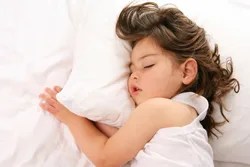No doubt one of the more challenging issues confronting parents of young children, bedwetting can be stressful for both the child and the parents, as well as siblings. A fairly common childhood problem, bedwetting occurs in about seven percent of 7-year-old children. But by the early teens, the incidence drops sharply, affecting only three percent of children in the U.S., and by the end of adolescence, bedwetting is almost nonexistent. In terms of statistics, time will solve your problem, though this may not provide comfort at the moment.

Bedwetting becomes a problem when parents begin to expect children to go without diapers at night — which should occur by the time the child is 4 or 5 years old. Parents are not the cause of the problem, nor is poor toilet training. Studies suggest that bedwetting may be related to problems in the development of the brain and nervous system, but the actual mechanism of bedwetting is not fully understood.
In some cases, bedwetting can be traced to a significant change in a child’s life — such as moving or the breakup of parents. The stress of the traumatic event may lead to bedwetting for a period of time — until the youngster adjusts to the new situation. In some cases, bedwetting can become the cause of emotional problems as well. Kids may not want to sleep over at friends’ houses or go away to overnight camp because they wet their beds. In addition, some siblings may make fun of them.
The most common and effective treatment involves positive reinforcement. Enlist the child’s interest in identifying it as a problem that needs to be fixed. You can make a star chart with awards for having dry nights; the more dry nights a child can string together, the greater the reward. Often the parents’ praise is enough. It is an effective treatment in part because you help the child to feel a sense of accomplishment when they’ve achieved a dry night. After a few weeks to a few months of work, this approach works for up to 80 percent of children.
If behavioral intervention is not successful, however, there are other solutions. “Bed alarms”, which sense the moisture level of the sheets, can activate as a child begins to wet his or her bed. Older children should be involved in cleaning up their soiled bed linens and pajamas, giving them a greater sense of privacy and responsibility.
There are also two types of effective medications. Tricyclic antidepressants, such as amitriptyline, can be used, although side-effects can include sleepiness and dry mouth. The other medication that has become widely used recently is known as “DDAVP”, which comes in a nasal spray or pill. DDAVP inhibits the hormone that regulates the kidneys, so if taken before bed, the child does not produce much urine during the night. DDAVP has immediate results, and can be especially useful in situations where the child is going away for camp or a trip. These drugs cannot be used indefinitely, however, so parents and children alike must seek a long-term solution.
Some basic precautions can help minimize the problem until it is resolved. Cover your child’s mattress in plastic to prevent damage, and use washable blankets. Parents should also be patient with children while they try to solve their bedwetting problem. Children are not trying to be lazy or provocative by wetting their beds, and parents who are harsh in pressing their child may make things worse, because they can make the child angry and less motivated to solve the problem.


















